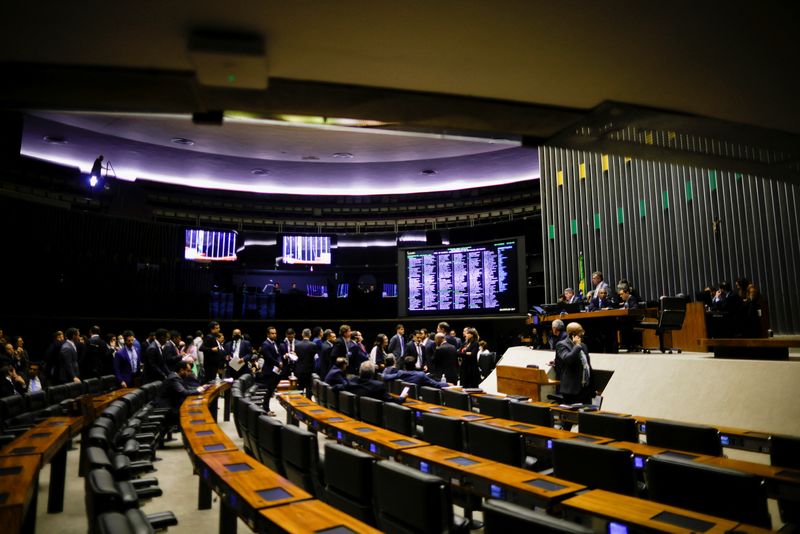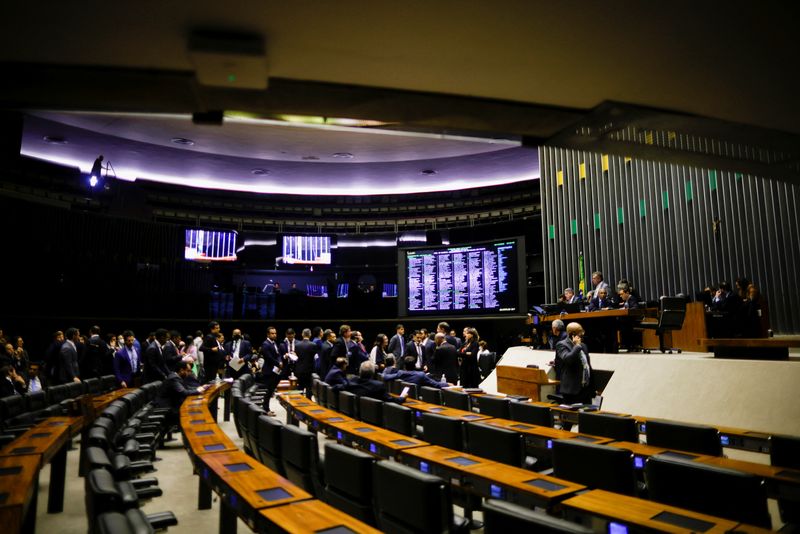Economy
Brazil’s lower house approves ‘historic’ tax reform bill


© Reuters. A general view shows the plenary of the Chamber of Deputies during a session to vote on a constitutional amendment that increases the government spending ceiling in Brasilia, Brazil December 20, 2022. REUTERS/Adriano Machado/File Photo
By Maria Carolina Marcello and Gabriel Araujo
BRASILIA (Reuters) -Brazil’s lower house of Congress approved on Friday the main text of a tax reform that will restructure the country’s complex consumption taxes, a move President Luiz Inacio Lula da Silva touted as a “great victory”.
Such a reform – previously attempted by various administrations without success – is a key step in Lula’s plan to boost growth.
Lawmakers at the chamber voted in two rounds to approve the reform and are set to conclude voting some amendments later in the day, after which the bill will be sent to the Senate, where it will also be voted on in two rounds.
“It’s a historic moment and a great victory,” Lula tweeted after the voting. “Brazil will have its first tax reform of the democratic period … We are working towards a better future for everyone.”
Starting in 2026, the reform plans to over eight years merge five levies currently in place into a value-added tax (VAT) with separate federal and regional rates, which will be defined later by a complementary law.
The approved proposal also shifts the tax basis from where goods are produced to where they are consumed over a 50-year transition period, starting in 2029.
The change, which is expected to benefit Brazil’s wealthier and more populous states, is likely to encounter stronger opposition and calls for broader compensation measures in the Senate, where state governors hold greater influence.
Markets reacted positively to the lower house approval, with Brazil’s real strengthening more than 1% against the dollar, while benchmark stock index jumped 1.4%.
“For a while, many doubted that the reform would be approved,” economists at JPMorgan (NYSE:) said. “Long-term transition means that complexity will remain high for some time, but we look for enhanced productivity and higher growth down the line.”
‘A NECESSITY’
The lower house approved the reform by 382-118 in the first round of voting held late on Thursday. Lawmakers then passed it in a second round overnight by 375-113, a wide margin as 308 votes were needed for the proposal to be approved.
“It’s a necessity for our economy so our productivity can advance,” Finance Minister Fernando Haddad said. “The outdated way in which taxes are currently organized greatly hinders industry, commerce and services.”
Haddad told reporters on Friday he does not expect the reform to face much opposition in the Senate in the second half of the year, noting he had already received calls from senators praising the approved text.
Senate head Rodrigo Pacheco later congratulated the lower house for its decision and said it was now “up to the Senate to fulfill its role in delivering this important reform,” reinforcing his support to the bill.
The approval was a major win for lower house Speaker Arthur Lira, who strongly backed the project, with lawmakers from the big tent “Centrao” bloc he leads overwhelmingly voting to pass it.
However, it represented a huge defeat for former President Jair Bolsonaro as he tries to lead the opposition to the Lula administration despite being barred from running for office until 2030.
The former far-right leader campaigned against the reform and urged lawmakers to vote against it, saying he could never back something coming from Lula’s leftist Workers’ Party. Bolsonaro’s efforts were in vain and even some members of his party voted to pass the bill.
Economy
Russian central bank says it needs months to make sure CPI falling before rate cuts -RBC


© Reuters. Russian Central Bank Governor Elvira Nabiullina attends a news conference in Moscow, Russia June 14, 2019. REUTERS/Shamil Zhumatov/File Photo
MOSCOW (Reuters) – Russia’s central bank will need two to three months to make sure that inflation is steadily declining before taking any decision on interest rate cuts, the bank’s governor Elvira Nabiullina told RBC media on Sunday.
The central bank raised its key interest rate by 100 basis points to 16% earlier in December, hiking for the fifth consecutive meeting in response to stubborn inflation, and suggested that its tightening cycle was nearly over.
Nabiullina said it was not yet clear when exactly the regulator would start cutting rates, however.
“We really need to make sure that inflation is steadily decreasing, that these are not one-off factors that can affect the rate of price growth in a particular month,” she said.
Nabiullina said the bank was taking into account a wide range of indicators but primarily those that “characterize the stability of inflation”.
“This will take two or three months or more – it depends on how much the wide range of indicators that characterize sustainable inflation declines,” she said.
The bank will next convene to set its benchmark rate on Feb. 16.
The governor also said the bank should have started monetary policy tightening earlier than in July, when it embarked on the rate-hiking cycle.
Economy
China identifies second set of projects in $140 billion spending plan


© Reuters. FILE PHOTO: Workers walk past an under-construction area with completed office towers in the background, in Shenzhen’s Qianhai new district, Guangdong province, China August 25, 2023. REUTERS/David Kirton/File Photo
SHANGHAI (Reuters) – China’s top planning body said on Saturday it had identified a second batch of public investment projects, including flood control and disaster relief programmes, under a bond issuance and investment plan announced in October to boost the economy.
With the latest tranche, China has now earmarked more than 800 billion yuan of its 1 trillion yuan ($140 billion) in additional government bond issuance in the fourth quarter, as it focuses on fiscal steps to shore up the flagging economy.
The National Development and Reform Commission (NDRC) said in a statement on Saturday it had identified 9,600 projects with planned investment of more than 560 billion yuan.
China’s economy, the world’s second largest, is struggling to regain its footing post-COVID-19 as policymakers grapple with tepid consumer demand, weak exports, falling foreign investment and a deepening real estate crisis.
The 1 trillion yuan in additional bond issuance will widen China’s 2023 budget deficit ratio to around 3.8 percent from 3 percent, the state-run Xinhua news agency has said.
“Construction of the projects will improve China’s flood control system, emergency response mechanism and disaster relief capabilities, and better protect people’s lives and property, so it is very significant,” the NDRC said.
The agency said it will coordinate with other government bodies to make sure that funds are allocated speedily for investment and that high standards of quality are maintained in project construction.
($1 = 7.1315 renminbi)
Economy
Russian central bank says it needs months to make sure CPI falling before rate cuts -RBC


© Reuters. Russian Central Bank Governor Elvira Nabiullina attends a news conference in Moscow, Russia June 14, 2019. REUTERS/Shamil Zhumatov/File Photo
MOSCOW (Reuters) – Russia’s central bank will need two to three months to make sure that inflation is steadily declining before taking any decision on interest rate cuts, the bank’s governor Elvira Nabiullina told RBC media on Sunday.
The central bank raised its key interest rate by 100 basis points to 16% earlier in December, hiking for the fifth consecutive meeting in response to stubborn inflation, and suggested that its tightening cycle was nearly over.
Nabiullina said it was not yet clear when exactly the regulator would start cutting rates, however.
“We really need to make sure that inflation is steadily decreasing, that these are not one-off factors that can affect the rate of price growth in a particular month,” she said.
Nabiullina said the bank was taking into account a wide range of indicators but primarily those that “characterize the stability of inflation”.
“This will take two or three months or more – it depends on how much the wide range of indicators that characterize sustainable inflation declines,” she said.
The bank will next convene to set its benchmark rate on Feb. 16.
The governor also said the bank should have started monetary policy tightening earlier than in July, when it embarked on the rate-hiking cycle.

 Forex3 years ago
Forex3 years agoForex Today: the dollar is gaining strength amid gloomy sentiment at the start of the Fed’s week

 Forex3 years ago
Forex3 years agoUnbiased review of Pocket Option broker

 Forex3 years ago
Forex3 years agoDollar to pound sterling exchange rate today: Pound plummeted to its lowest since 1985

 Forex3 years ago
Forex3 years agoHow is the Australian dollar doing today?

 Cryptocurrency3 years ago
Cryptocurrency3 years agoWhat happened in the crypto market – current events today

 World3 years ago
World3 years agoWhy are modern video games an art form?

 Commodities3 years ago
Commodities3 years agoCopper continues to fall in price on expectations of lower demand in China

 Economy3 years ago
Economy3 years agoCrude oil tankers double in price due to EU anti-Russian sanctions





















